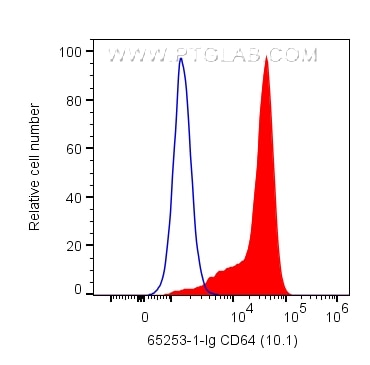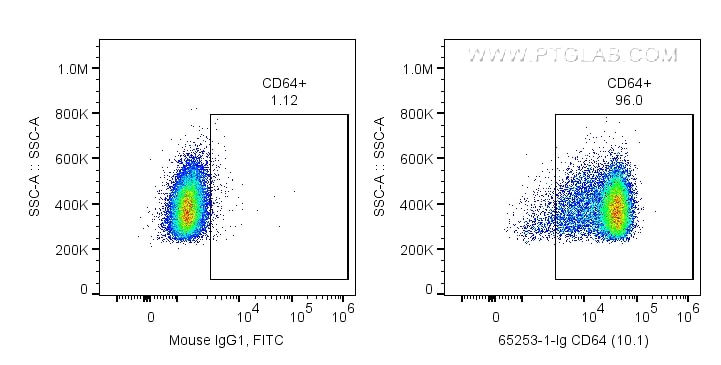Anticorps Monoclonal anti-CD64
CD64 Monoclonal Antibody for FC, ELISA
Hôte / Isotype
Mouse / IgG1, kappa
Réactivité testée
Humain
Applications
FC, ELISA
Conjugaison
Non conjugué
CloneNo.
10.1
N° de cat : 65253-1-Ig
Synonymes
Galerie de données de validation
Applications testées
| Résultats positifs en cytométrie | CMSP humaines, |
Dilution recommandée
| Application | Dilution |
|---|---|
| This reagent has been tested for flow cytometric analysis. It is recommended that this reagent should be titrated in each testing system to obtain optimal results. | |
| Sample-dependent, check data in validation data gallery | |
Informations sur le produit
65253-1-Ig cible CD64 dans les applications de FC, ELISA et montre une réactivité avec des échantillons Humain
| Réactivité | Humain |
| Hôte / Isotype | Mouse / IgG1, kappa |
| Clonalité | Monoclonal |
| Type | Anticorps |
| Immunogène | Human rheumatoid synovial fluid cells and fibronectin-purified monocytes. |
| Nom complet | Fc fragment of IgG, high affinity Ia, receptor (CD64) |
| Masse moléculaire calculée | 374 aa, 43 kDa |
| Numéro d’acquisition GenBank | BC032634 |
| Symbole du gène | FCGR1A |
| Identification du gène (NCBI) | 2209 |
| Conjugaison | Non conjugué |
| Forme | Liquide |
| Méthode de purification | Purification par affinité |
| Tampon de stockage | PBS with 0.09% sodium azide. |
| Conditions de stockage | Store at 2-8°C. Stable for one year after shipment. |
Informations générales
Fcγ receptor comprise a multigene family of integral membrane glycoproteins that exhibit complex activation or inhibitory effects on cell functions after aggregation by complexed immunoglobulin G (IgG) (PMID: 17005690 ). CD64, also known as FcγRIA, is a high-affinity receptor for the Fc region of IgG. It is expressed by monocytes/macrophages, activated neutrophils, dendritic cells, and early myeloid cells (PMID: 23293080; 19642859; 7680917). CD64 functions in both innate and adaptive immune responses.
Protocole
| Product Specific Protocols | |
|---|---|
| FC protocol for CD64 antibody 65253-1-Ig | Download protocol |
| Standard Protocols | |
|---|---|
| Click here to view our Standard Protocols |



